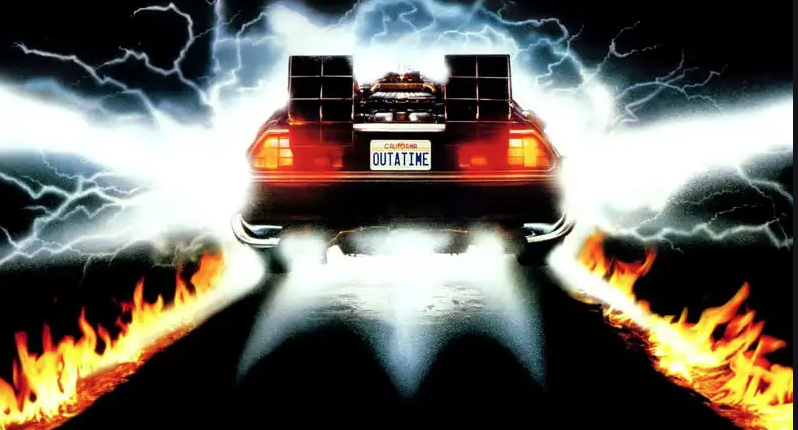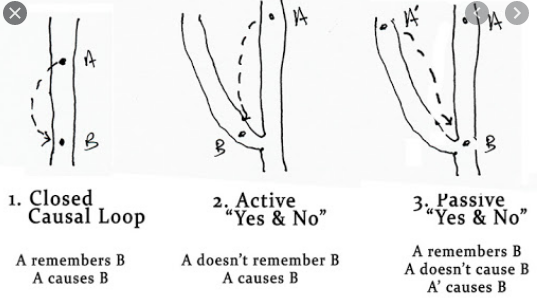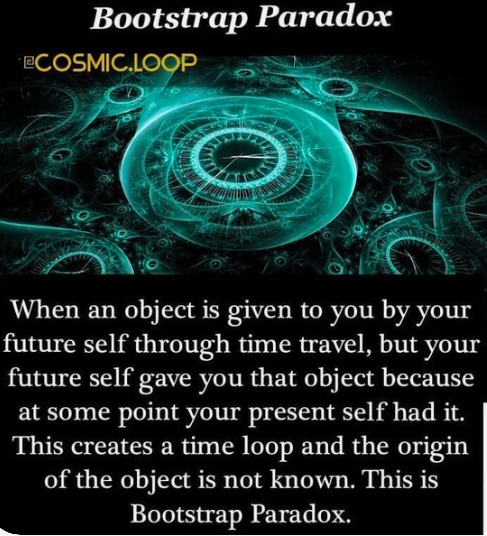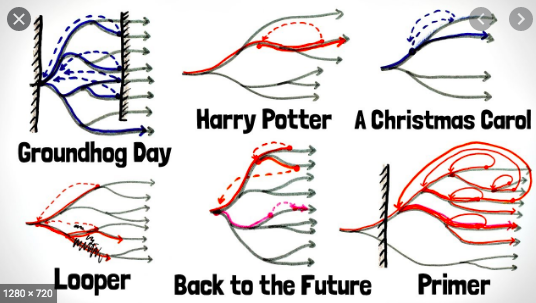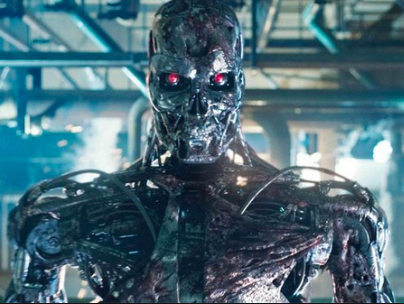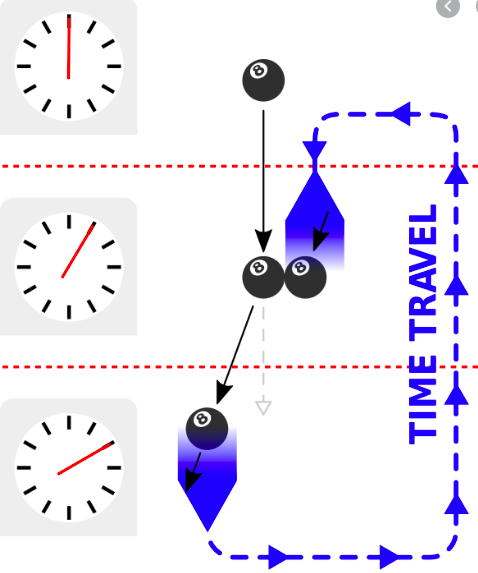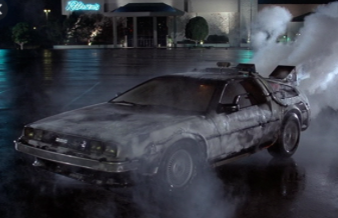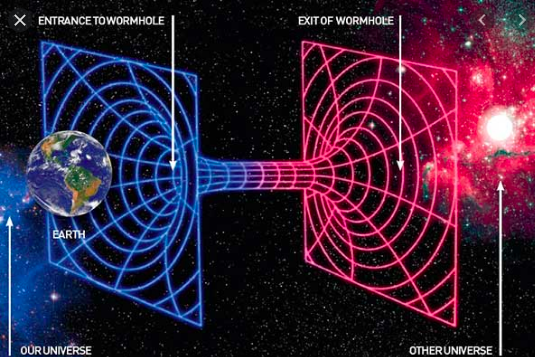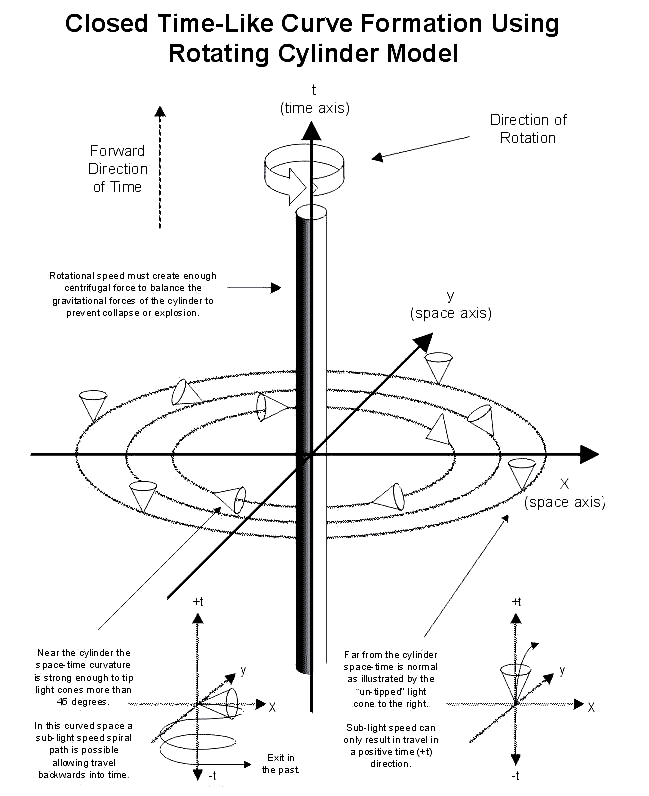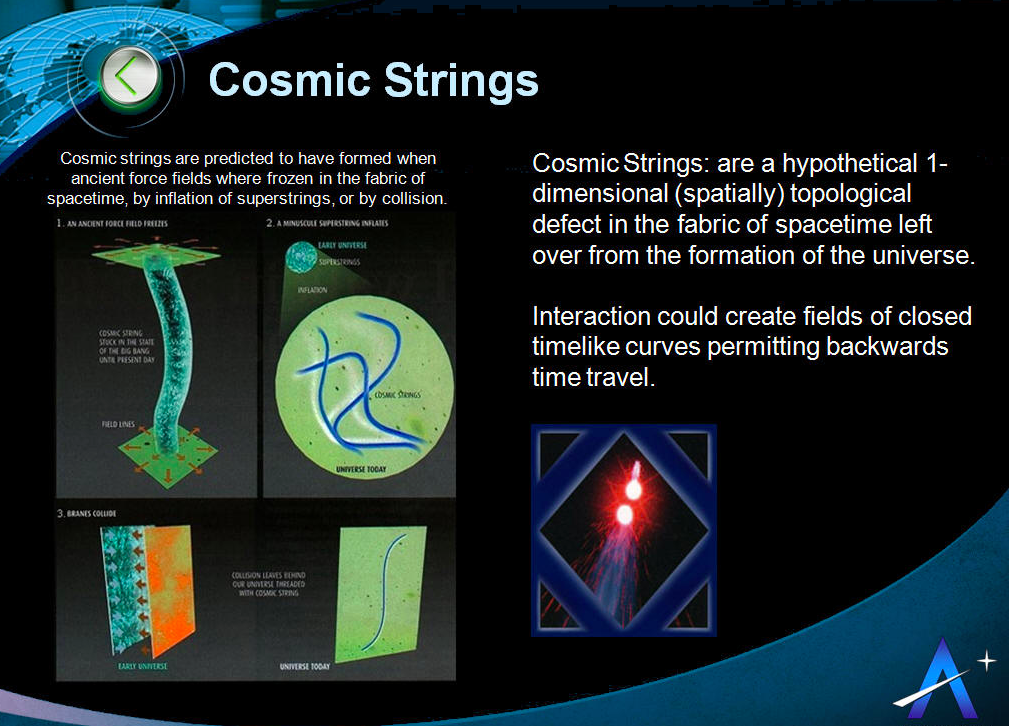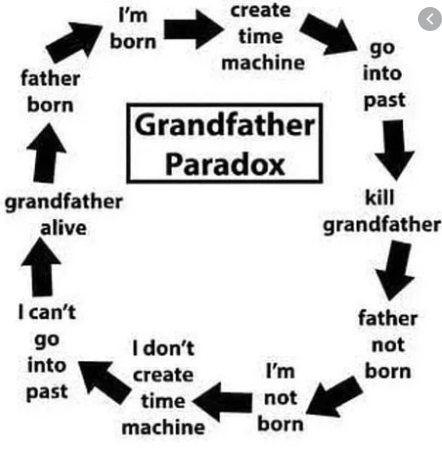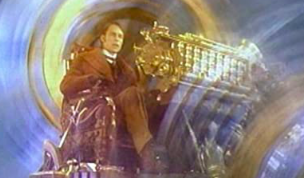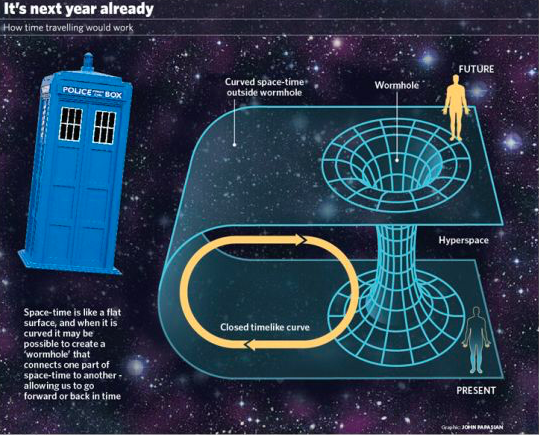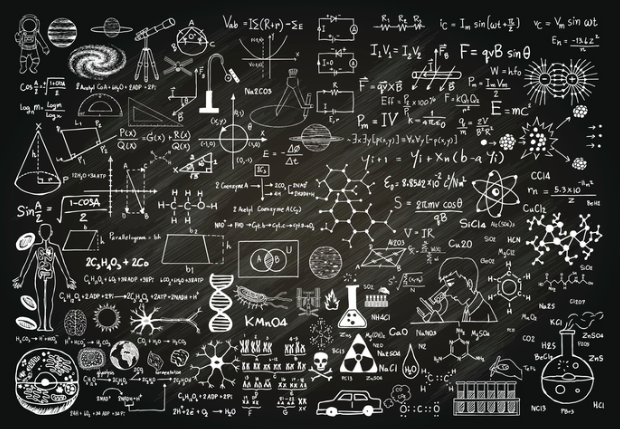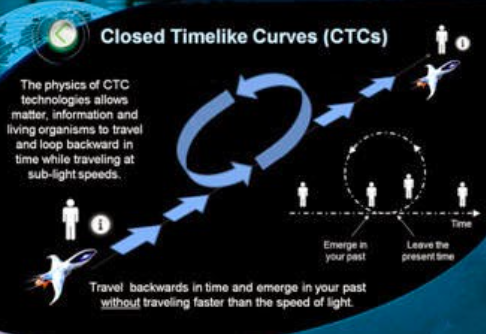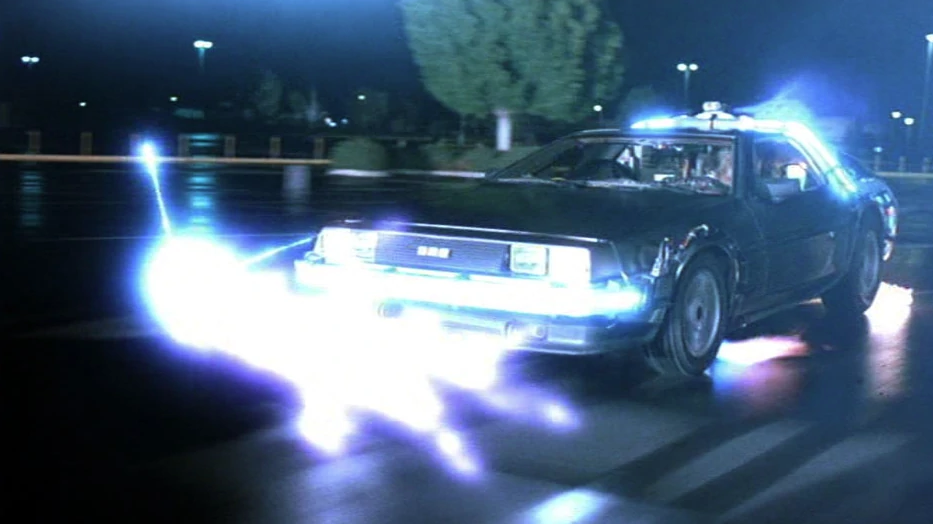
Time Paradox Explained - Back to the Future
Great Scott !!! We feature Doc Brown’s Time Travelling DeLorean in our Blog about one of the wonders of Time Travel the Time Paradox. What is a Time Paradox - How does it relate to Time Travel and we discuss the science involved.
Time Paradox
“Doc: “I foresee two possibilities. One, seeing herself thirty years in the future would put Jennifer into shock and she’d simply pass out. Or two, the encounter could create a time paradox. The results of which could cause a chain reaction that would unravel the very fabric of the space-time continuum and destroy the entire universe!... Granted, that’s the worst-case scenario. The destruction however might be limited merely to our own galaxy.”
Marty: “Well that’s a relief!”
— Doc and Marty discussing the implications of 1985 Jennifer running into her 2015 self.
A paradox, in time travel, is “a situation in which the effect of an incident contradicts or eliminates the cause of that same incident”.[1]
”
Time travel paradox Explained
The Earth rotates around the sun - the sun rotates around the galaxy - the galaxy moves in the universe. All that being said, if the time machine were possible, the DeLorean would be in a different place, and not the same place each time it moves into the past or future.
Solar System
Here’s one possible answer: The time machine is still affected by the gravitation pull of a body such as that on Earth.
Expounding upon that: Views from inside the time machine indicate that the DeLorean time machine is traveling through a portal that only opens when the machine reaches 88 miles per hour.
Since time travel hasn't been witnessed, it's plausible that the unopened time portals are held in place by the Earth's gravity or by a physical force not yet proven. The ideas behind the first paragraph, about Earth's movement in space, have been discussed in the article about spatial displacement.
DeLorean Time Travel
Behind the scenes
The word "paradox" is often used to describe a mystery or an unanswered question. eg :
Paradox was also the title of the musical score played during the scene in Part II in which the time-traveling Doc Brown talked with his younger self while handing himself a wrench to attach the electrical cable to the lamppost in 1955; since Doc Brown caused a "pair o' Docs" to occur.
Doc Brown
Though many paradoxes arise in the trilogy, Doc may be overzealous about them because, though the effects obviously happen, the risk of destroying the space-time continuum may not really exist, mearly being a fabrication of Doc's mind to give reason to fix time-lines.
Evidence of such exists, because 1985 Doc was willing to correct 1955 Doc with the wrench size and give him the suggestion that he was conducting a weather experiment as well as telling him there was going to be a storm. He also gave 1955 Doc information on how to repair the DeLorean, via the letter, while he was stuck in 1885, knowing the risks.
There is nothing in Einstein’s theories of relativity to rule out time travel, although the very notion of traveling to the past violates one of the most fundamental premises of physics, that of causality.
With the laws of cause and effect out the window, there naturally arises a number of inconsistencies associated with time travel, and listed here are some of those paradoxes which have given both scientist and time travel movie buffs alike more than a few sleepless nights over the years.
The time travel paradoxes which follow fall into two broad categories:
1) Closed Causal Loops, such as the Predestination Paradox and the Bootstrap Paradox, which involve a self-existing time loop in which cause and effect run in a repeating circle, but is also internally consistent with the timeline’s history.
2) Consistency Paradoxes, such as the Grandfather Paradox and other similar variants such as The Hitler paradox, and Polchinski’s Paradox, which generate a number of timeline inconsistencies related to the possibility of altering the past.
1: Predestination Paradox
Travel through Time
A Predestination Paradox occurs when the actions of a person traveling back in time becomes part of past events, and may ultimately causes the event he is trying to prevent to take place.
This results in a ‘temporal causality loop’ in which (Event 1) in the ‘past’ influences (Event 2) in the ‘future’ (time travel to the past) which then causes (Event 1) to occur.
With this circular loop of events ensuring that history is not altered by the time traveler, and that any attempts to stop something from happening in the past, will simply lead to the cause itself, instead of stopping it.
This paradox suggests that things are always destined to turn out the same way, and that whatever has happened must happen.
Sound complicated? …… O.K this may sound a grim, but just for a moment Imagine that your lover dies in a hit-and-run car accident, and you travel back in time to save her from her fate, only to find that on your way to the accident you are the one who accidentally runs her over.
Your attempt to change the past has therefore resulted in a predestination paradox. One way of dealing with this type of paradox is to assume that the version of events you have experienced are already built into a self-consistent version of reality, and that by trying to alter the past you will only end up fulfilling your role in creating an event in history, not altering it.
– Cinema Treatment
The Time Machine (2002)
In ‘The Time Machine’ Movie' in (2002) for instance, Dr. Alexander Hartdegen witnesses his fiancee being killed by a mugger, leading him to build a time machine to travel back in time to save her from her fate.
His subsequent attempts to save her fail, though, leading him to conclude that “I could come back a thousand times… and see her die a thousand ways.” After then traveling centuries into the future to see if a solution has been found to the temporal problem, Hartdegen is told by the Über-Morlock:
“You built your time machine because of Emma’s death. If she had lived, it would never have existed, so how could you use your machine to go back and save her? You are the inescapable result of your tragedy, just as I am the inescapable result of you.”
The DeLorean Time Machine
Movies: Examples of predestination paradoxes in the movies include :
12 Monkeys (1995), TimeCrimes (2007), The Time Traveler’s Wife (2009), and Predestination (2014).
Books: An example of a predestination paradox in a book is Phoebe Fortune and the Pre-destination Paradox by M.S. Crook.
2: Bootstrap Paradox
Bootstrap Paradox
A Bootstrap Paradox is a type of paradox in which an object, person, or piece of information sent back in time results in an infinite loop where the object has no discernible origin, and exists without ever being created.
It is also known as an Ontological Paradox, as ontology is a branch of philosophy concerned with the nature of being, or existence.
– Information: George Lucas traveling back in time and giving himself the scripts for the Star War movies which he then goes on to direct and gain great fame for would create a bootstrap paradox involving information, as the scripts have no true point of creation or origin.
– Person: A bootstrap paradox involving a person could be, say, a 20 year old male time traveler who goes back 21 years, meets a woman, has an affair, and returns home three months later without knowing the woman was pregnant. Her child grows up to be the 20 year old time traveler, who travels back 21 years through time, meets a woman, and so on.
These ontological paradoxes imply that the future, present and past are not defined, thus giving scientists an obvious problem on how to then pinpoint the “origin” of anything, a word customarily referring to the past, but now rendered meaningless.
Further questions arise as to how the object/data was created, and by whom. Nevertheless, Einstein’s field equations allow for the possibility of closed time loops, with Kip Thorne the first theoretical physicist to recognize traversable wormholes and backwards time travel as being theoretically possible under certain conditions.
Movies: Examples of bootstrap paradoxes in the movies include ‘Somewhere in Time’ (1980), ‘Bill and Ted’s Excellent Adventure’ (1989), ‘The Terminator’ movies, and ‘Time Lapse’ (2014). The Netflix series Dark (2017-19) also features a book called ‘A Journey Through Time’ which presents another classic example of a bootstrap paradox.
Books: Examples of bootstrap paradoxes in books include Michael Moorcock’s ‘Behold The Man’, Tim Powers’ The Anubis Gates, and Heinlein’s “By His Bootstraps”
Cyberdyne Systems Model 101
3: Grandfather Paradox
The Grandfather Paradox concerns ‘self-inconsistent solutions’ to a timeline’s history caused by traveling back in time. For example :
Again we are going to be very grim for a minuet, if you traveled to the past and killed your grandfather, you would never have been born and would not have been able to travel to the past – a paradox. Let’s say you did decide to kill your grandfather because he created a dynasty that ruined the world. You figure if you knock him off before he meets your grandmother then the whole family line (including you) will vanish and the world will be a better place. According to theoretical physicists, the situation could play out as follows:
The Grandfather Paradox
– Time line protection hypothesis: You pop back in time, walk up to him, and point a revolver at his head. You pull the trigger but the gun fails to fire. Click! Click! Click! The bullets in the chamber have dents in the firing caps. You point the gun elsewhere and pull the trigger. Bang! Point it at your grandfather.. Click! Click! Click! So you try another method to kill him, but that only leads to scars that in later life he attributed to the world’s worst mugger. You can do many things as long as they’re not fatal until you are chased off by a policeman.
– Multiple universes hypothesis: You pop back in time, walk up to him, and point a revolver at his head. You pull the trigger and Boom! The deed is done. You return to the “present” but you never existed here. Everything about you has been erased, including your family, friends, home, possessions, bank account, and history. You’ve entered a timeline where you never existed. Scientists entertain the possibility that you have now created an alternate timeline or entered a parallel universe.
Movies: Example of the Grandfather Paradox in movies include ‘Back to the Future’ (1985), ‘Back to the Future Part II’ (1989), and ‘Back to the Future Part III’ (1990).
Books: Example of the Grandfather Paradox in books include Dr. Quantum in the Grandfather Paradox by Fred Alan Wolf, The Grandfather Paradox by Steven Burgauer, and Future Times Three (1944) by René Barjavel, the very first treatment of a grandfather paradox in a novel.
4: Let’s Kill Hitler Paradox
We will steer off this subject soon but similar to the Grandfather Paradox which paradoxically prevents your own birth, the Killing Hitler paradox erases your own reason for going back in time to kill him. Furthermore, while killing Grandpa might have a limited “butterfly effect”, killing Hitler would have far-reaching consequences for everyone in the world, even if only for the fact you studied him in school.
The paradox itself arises from the idea that if you were successful, then there would be no reason to time travel in the first place. If you killed Hitler then none of his actions would trickle down through history and cause you to want to make the attempt.
Movies/Shows: By far the best treatment for this notion occurred in a ‘Twilight Zone’ episode called ‘Cradle of Darkness’ that sums up the difficulties involved in trying to change history, with another being an episode of Dr Who called ‘Let’s Kill Hitler’.
Books: Examples of the Let’s Kill Hitler Paradox in books include How to Kill Hitler: A Guide For Time Travelers by Andrew Stanek, and the graphic novel I Killed Adolf Hitler by Jason.
5: Polchinski’s Paradox
American theoretical physicist Joseph Polchinski proposed a time paradox scenario in which a billiard ball enters a wormhole, and emerges out the other end in the past just in time to collide with its younger version and stop it going into the wormhole in the first place.
Polchinski’s Paradox
Polchinski’s paradox is taken seriously by physicists, as there is nothing in 'Einstein’s General Relativity to rule out the possibility of time travel, closed time-like curves (CTCs), or tunnels through space-time.
Furthermore, it has the advantage of being based upon the laws of motion, without having to refer to the indeterministic concept of free will, and so presents a better research method for scientists to think about the paradox.
When Joseph Polchinski proposed the paradox, he had Novikov’s Self-Consistency Principle in mind, which basically states that while time travel is possible, time paradoxes are forbidden.
However, a number of solutions have been formulated to avoid the inconsistencies Polchinski suggested, which essentially involves the billiard ball delivering a blow which changes its younger version’s course, but not enough to stop it entering the wormhole.
This solution is related to the ‘timeline-protection hypothesis’ which states that a probability distortion would occur in order to prevent a paradox from happening. This also helps explain why if you tried to time travel and murder your grandfather, something will always happen to make that impossible, thus preserving a consistent version of history.
Books: Paradoxes of Time Travel by Ryan Wasserman is a wide-ranging exploration on the topic of time travel, including Polchinski’s Paradox.
Are Self-fulfilling Prophecies Paradoxes?
A self-fulfilling prophecy is only a causality loop when the prophecy is truly known to happen and events in the future cause effects in the past, otherwise the phenomenon is not so much a paradox as a case of cause and effect.
Say, for instance, an authority figure states that something is inevitable, proper, and true, convincing everyone through persuasive style. People, completely convinced through rhetoric, begin to behave as if the prediction were already true, and consequently bring it about through their actions. This might be seen best by an example where someone convincingly states:
“High-speed Magnetic Levitation Trains will dominate as the best form of transportation from the 21st Century onward.”
Jet travel, relying on diminishing fuel supplies, will be reserved for ocean crossing, and local flights will be a thing of the past. People now start planning on building networks of high-speed trains that run on electricity. Infrastructure gears up to supply the needed parts and the prediction becomes true not because it was truly inevitable (though it is a smart idea), but because people behaved as if it were true.
It even works on a smaller scale – the scale of individuals. The basic methodology for all those “self-help” books out in the world is that if you modify your thinking that you are successful (money, career, dating, etc.), then with the strengthening of that belief you start to behave like a successful person. People begin to notice and start to treat you like a successful person; it is a reinforcement/feedback loop and you actually become successful by behaving as if you were.
Are Time Paradoxes Inevitable?
The Butterfly Effect is a reference to Chaos Theory where seemingly trivial changes can have huge cascade reactions over long periods of time. Consequently, the Timeline corruption hypothesis states that time paradoxes are an unavoidable consequence of time travel, and even insignificant changes may be enough to alter history completely.
Lets explain this theory in a little story ….
A paleontologist, with the help of a time travel device, travels back to the Jurassic Period to get photographs of Stegosaurus, Brachiosaurus, Ceratosaurus, and Allosaurus amongst other dinosaurs. He knows he can’t take samples so he just takes magnificent pictures from the fixed platform that is positioned precisely to not change anything about the environment.
His assistant is about to pick a long blade of grass, but he stops him and explains how nothing must change because of their presence. They finish what they are doing and return to the present, but everything is gone. They reappear in a wild world with no humans, and no signs that they ever existed..
They fall to the floor of their platform, the only man-made thing in the whole world, and lament “Why? We didn’t change anything!” And there on the heel of the scientist’s shoe is a crushed butterfly.
Butterfly Effect
The Butterfly Effect is also a movie, starring Ashton Kutcher as Evan Treborn and Amy Smart as Kayleigh Miller, where a troubled man has had blackouts during his youth, later explained by him traveling back into his own past and taking charge of his younger body briefly. The movie explores the issue of changing the timeline and how unintended consequences can propagate.
Solutions
Scientists eager to avoid the paradoxes presented by time travel have come up with a number of ingenious ways in which to present a more consistent version of reality, some of which have been touched upon here, including:
–The Solution: time travel is impossible because of the very paradox it creates.
–Self-healing hypothesis: successfully altering events in the past will set off another set of events which will cause the present to remain the same.
–The Multiverse or “many-worlds” hypothesis: an alternate parallel universe or timeline is created each time an event is altered in the past.
–Erased timeline hypothesis: a person traveling to the past would exist in the new timeline, but have their own timeline erased.
Thank you to KEVIN BONSOR & ROBERT LAMB for this excellent article.
Here’s some more Paradox theory’s for you to think about ….
As we mentioned before, the concept of traveling into the past becomes a bit murky the second causality rears its head. Cause comes before effect, at least in this universe, which manages to muck up even the best-laid time traveling plans.
For starters, if you traveled back in time 200 years, you'd emerge in a time before you were born. Think about that for a second. In the flow of time, the effect (you) would exist before the cause (your birth).
A math professor travels into the future and steals a groundbreaking math theorem. The professor then gives the theorem to a promising student. Then, that promising student grows up to be the very person from whom the professor stole the theorem to begin with.
Then there's the post-selected model of time travel, which involves distorted probability close to any paradoxical situation [source: Sanders].
What does this mean? Well, put yourself in the shoes of the time-traveling assassin again. This time travel model would make your grandfather virtually death proof. You can pull the trigger, but the laser will malfunction. Perhaps a bird will poop at just the right moment, but some quantum fluctuation will occur to prevent a paradoxical situation from taking place.
But then there's another possibility: The future or past you travel into might just be a parallel universe. Think of it as a separate sandbox: You can build or destroy all the castles you want in it, but it doesn't affect your home sandbox in the slightest. So if the past you travel into exists in a separate timeline, killing your grandfather in cold blood is no big whoop. Of course, this might mean that every time jaunt would land you in a new parallel universe and you might never return to your original sandbox.
Confused yet? Welcome to the world of time travel.
Explore the links below for even more mind-blowing cosmology
A big thank you to Elizabeth Howell November 14, 2017 = Theories, Paradoxes & Possibilities
The DeLorean TIme Machine
Time travel may be theoretically possible, but it is beyond our current technological capabilities.
Time travel — moving between different points in time — has been a popular topic for science fiction for decades. Franchises ranging from "Doctor Who" to "Star Trek" to "Back to the Future" have seen humans get in a vehicle of some sort and arrive in the past or future, ready to take on new adventures. Each come with their own time travel theories.
The reality, however, is more muddled. Not all scientists believe that time travel is possible. Some even say that an attempt would be fatal to any human who chooses to undertake it.
Understanding time
What is time? While most people think of time as a constant, physicist Albert Einstein showed that time is an illusion; it is relative — it can vary for different observers depending on your speed through space.
Albert Einstein
To Einstein, time is the "fourth dimension." Space is described as a three-dimensional arena, which provides a traveler with coordinates — such as length, width and height —showing location. Time provides another coordinate — direction — although conventionally, it only moves forward. (Conversely, a new theory asserts that time is "real.")
Most physicists think time is a subjective illusion, but what if time is real?
Einstein's theory of special relativity says that time slows down or speeds up depending on how fast you move relative to something else. Approaching the speed of light, a person inside a spaceship would age much slower than his twin at home. Also, under Einstein's theory of general relativity, gravity can bend time.
As Marty McFly would say ‘ Doc this sounds Heavy ! ‘
Doc Brown
Picture a four-dimensional fabric called space-time. When anything that has mass sits on that piece of fabric, it causes a dimple or a bending of space-time. The bending of space-time causes objects to move on a curved path and that curvature of space is what we know as gravity.
Both the general and special relativity theories have been proven with GPS satellite technology that has very accurate timepieces on board. The effects of gravity, as well as the satellites' increased speed above the Earth relative to observers on the ground, make the unadjusted clocks gain 38 microseconds a day. (Engineers make calibrations to account for the difference.)
In a sense, this effect, called time dilation, means astronauts are time travelers, as they return to Earth very, very slightly younger than their identical twins that remain on the planet.
Through the wormhole
General relativity also provides scenarios that could allow travelers to go back in time, according to NASA. The equations, however, might be difficult to physically achieve.
Wormwhole
One possibility could be to go faster than light, which travels at 186,282 miles per second (299,792 kilometers per second) in a vacuum. Einstein's equations, though, show that an object at the speed of light would have both infinite mass and a length of 0. This appears to be physically impossible, although some scientists have extended his equations and said it might be done.
A linked possibility, NASA stated, would be to create "wormholes" between points in space-time. While Einstein's equations provide for them, they would collapse very quickly and would only be suitable for very small particles. Also, scientists haven't actually observed these wormholes yet. Also, the technology needed to create a wormhole is far beyond anything we have today.
Can You Time-Travel?
Alternate time travel theories
While Einstein's theories appear to make time travel difficult, some groups have proposed alternate solutions to jump back and forth in time.
Infinite cylinder
Astronomer Frank Tipler proposed a mechanism (sometimes known as a Tipler Cylinder) where one would take matter that is 10 times the sun's mass, then roll it into very long but very dense cylinder.
After spinning this up a few billion revolutions per minute, a spaceship nearby — following a very precise spiral around this cylinder — could get itself on a "closed, time-like curve", according to the Anderson Institute. There are limitations with this method, however, including the fact that the cylinder needs to be infinitely long for this to work.
An artist's impression of a black hole like the one weighed in this work, sitting in the core of a disk galaxy. The black-hole in NGC4526 weighs 450,000,000 times more than our own Sun. (Image credit: NASA/JPL-Caltech)
Black holes
Black Hole
Another possibility would be to move a ship rapidly around a black hole, or to artificially create that condition with a huge, rotating structure.
"Around and around they'd go, experiencing just half the time of everyone far away from the black hole. The ship and its crew would be traveling through time," physicist Stephen Hawking wrote in the Daily Mail in 2010.
"Imagine they circled the black hole for five of their years. Ten years would pass elsewhere. When they got home, everyone on Earth would have aged five years more than they had."
However, he added, the crew would need to travel around the speed of light for this to work. Physicist Amos Iron at the Technion-Israel Institute of Technology in Haifa, Israel pointed out another limitation if one used a machine: it might fall apart before being able to rotate that quickly.
Cosmic strings
Credit to Aderson Institute
Another theory for potential time travelers involves something called cosmic strings — narrow tubes of energy stretched across the entire length of the ever-expanding universe. These thin regions, left over from the early cosmos, are predicted to contain huge amounts of mass and therefore could warp the space-time around them.
Cosmic strings are either infinite or they’re in loops, with no ends, scientists say. The approach of two such strings parallel to each other would bend space-time so vigorously and in such a particular configuration that might make time travel possible, in theory.
Time machines
It is generally understood that traveling forward or back in time would require a device — a time machine — to take you there. Time machine research often involves bending space-time so far that time lines turn back on themselves to form a loop, technically known as a "closed time-like curve."
The Doctor's time machine is the TARDIS, which stands for ‘Time and Relative Dimensions in Space’.
Doctor Who Tardis
To accomplish this, time machines often are thought to need an exotic form of matter with so-called "negative energy density." Such exotic matter has bizarre properties, including moving in the opposite direction of normal matter when pushed. Such matter could theoretically exist, but if it did, it might be present only in quantities too small for the construction of a time machine.
However, time-travel research suggests time machines are possible without exotic matter. The work begins with a doughnut-shaped hole enveloped within a sphere of normal matter. Inside this doughnut-shaped vacuum, space-time could get bent upon itself using focused gravitational fields to form a closed time-like curve.
To go back in time, a traveler would race around inside the doughnut, going further back into the past with each lap. This theory has a number of obstacles, however. The gravitational fields required to make such a closed time-like curve would have to be very strong, and manipulating them would have to be very precise. [Related: Warp Speed, Scotty? Star Trek's FTL Drive May Actually Work]
Back to the Grandfather paradox
If that were to happen, some physicists say, you would be not be born in one parallel universe but still born in another. Others say that the photons that make up light prefer self-consistency in timelines, which would interfere with your evil, suicidal plan.
Some scientists disagree with the options mentioned above and say time travel is impossible no matter what your method. The faster-than-light one in particular drew derision from American Museum of Natural History astrophysicist Charles Lu.
That "simply, mathematically, doesn't work," he said in a past interview with sister site LiveScience.
Also, humans may not be able to withstand time travel at all. Traveling nearly the speed of light would only take a centrifuge, but that would be lethal, said Jeff Tollaksen, a professor of physics at Chapman University, in 2012.
Using gravity would also be deadly. To experience time dilation, one could stand on a neutron star, but the forces a person would experience would rip you apart first.
Time travel in fiction
Two 2015 articles by Space.com described different ways in which time travel works in fiction, and the best time-travel machines ever. Some methods used in fiction include:
Interstellar
One-way travel to the future: The traveler leaves home, but the people he or she left behind might age or be dead by the time the traveler returns. Examples: "Interstellar" (2014), "Ikarie XB-1" (1963)
Time travel by moving through higher dimensions: In "Interstellar" (2014), there are "tesseracts" (which is the four-dimensional analogue of the cube) available in which astronauts can travel because the vessel represents time as a dimension of space. A similar concept is expressed in Madeleine L'Engle's "A Wrinkle In Time" (2018, based on the book series that started in 1963), where time is folded by means of a tesseract. The book, however, uses supernatural beings to make the travel possible.
Travelling the space-time vortex: The famous "Doctor Who" (1963-present) TARDIS ("Time And Relative Dimension In Space") uses an extra-dimensional vortex to go through time, while the travelers inside feel time passing normally.
Instantaneous time jumping: Examples include "The Girl Who Leapt Through Time" (2006), the DeLorean from "Back To The Future" (1985), and the Mr. Peabody's WABAC machine from "The Rocky and Bullwinkle Show" (1959-64).
Time travelling while standing still: Both the "Time Machine" (1895 book) and Hermione Granger's Time-Turner from "Harry Potter" keep the traveler still while they move through time.
The Time Machine
Slow time travel: In "Primer" (2004), a traveler stays in a box while time traveling. For each minute they want to go back in time, they need to stay in the box for a minute. If they want to go back a day in time, they have to stay there for 24 hours.
Traveling faster than light: In "Superman: The Movie" (1979), Superman flies faster than light to go back in time and rescue Lois Lane before she is killed. The concept was also used in the 1980 novel "Timescape" by Gregory Benford, in which the protagonist sends (hypothetical) faster-than-light tachyon particles back to Earth in 1962 to warn of disaster. In several "Star Trek" episodes and movies, the Enterprise travels through time by going faster than light. In the comic book and TV series "The Flash," the super-speedster uses a cosmic treadmill to travel through time.
Star Trek
Difficult methods to categorize: There's a rocket sled in "Timecop" (1994) that pops in and out of view when it's being used, which has led to much speculation about what's going on. There's also the Time Displacement Equipment in "The Terminator" movie series, which shows off how to fight a war in four dimensions (including time).
So is time travel possible?
While time travel does not appear possible — at least, possible in the sense that the humans would survive it — with the physics that we use today, the field is constantly changing. Advances in quantum theories could perhaps provide some understanding of how to overcome time travel paradoxes.
One possibility, although it would not necessarily lead to time travel, is solving the mystery of how certain particles can communicate instantaneously with each other faster than the speed of light.
In the meantime, however, interested time travelers can at least experience it vicariously through movies, television and books.
Article credits to www.space.com Elizabeth Fernandez
More Time Travel and Philosophy
In general relativity, things called closed time-like curves can exist, and are a way to solve general field equations.
It’s like stepping on a train, taking a wonderful trip through the mountains, and returning to the same spot you left off, both in space and in time.
That means the moment where you step off the train is both in the past and future of when you got on the train in the first place. In a closed time-like curve, an object returns to the same place and time that it was in the past, completing a loop. It’s unclear if closed time-like curves exist in our universe, but if they do, mathematically, they would allow for time travel.
Then there’s option two.
In this quantum mechanical model, each choice opens up another universe. If time travelers changed something in the past, they would enter another parallel universe.
The original timeline would still exist, one among many branching worlds. In such a model, it might be very hard for time travelers to return to the universe they came from.
Finally - if time travel is possible, time travelers can only do certain things.
A time traveler who went back in time, for example, could not kill Hitler, no matter what he tried. This raises all sorts of philosophical problems - does the time traveler still have free will? It’s difficult to say time travel is possible while simultaneously destroying freedom of choice.
Paradox-Free Time Travel While Preserving Freedom of Choice
That’s where young physicist Germain Tobar steps in.
Under the supervision of physicist Dr. Fabio Costa, Tobar came up with a way to mathematically preserve freedom of choice, while allowing for paradox-free time travel.
For example, let’s imagine there is a scientist in a laboratory with a time-traveling coin.
The coin enters the laboratory at some point in the past as “heads” and leaves at some point in the future as “tails”. Tobar’s model fixes the boundary conditions - the point in time where the coin enters and leaves the laboratory - as always heads and tails.
Then, his model allows the state of the coin to change when it is in the laboratory. Since the initial and final state of the coin is fixed, a paradox is avoided. However, anything can happen to the coin when it is in the laboratory. “For example,” says Tobar, “she [the scientist] can decide to always flip the coin, or always prepare heads regardless of what she got... it can flip, it can hit other coins, and so on.” But no matter what she did or how hard she tried, each time the coin time-travels through her lab, it will always leave as “tails”.
Let’s take another pertinent example. “Say you traveled in time, in an attempt to stop COVID-19’s patient zero from being exposed to the virus,” Costa says. “However if you stopped that individual from becoming infected – that would eliminate the motivation for you to go back and stop the pandemic in the first place.”
In Tobar’s model, no matter what you did, the virus would still escape somehow. “You might try and stop patient zero from becoming infected, but in doing so you would catch the virus and become patient zero, or someone else would,” says Tobar. “No matter what you did, the salient events would just recalibrate around you.”
Even time travellers couldn't stop the spread of the coronavirus.
That means that you have complete freedom of choice, but no matter how hard you tried, you could not stop COVID-19 from escaping.
But this is good news for Marty McFly in Back to the Future. Nothing he did could prevent his parents from falling in love and getting married, and eventually, allowing Marty to be born. Other things might change, like how they met, or what his father ate for breakfast that morning. But nothing could change their eventual meeting.
This doesn’t necessarily rule out other models of time travel, for example, a quantum mechanical one.
Quantum Mechanics
“Some of the quantum approaches would indeed invoke the existence of multiple universes, which interact through the time machine, possibly creating alternate timelines,” says Tobar. Instead, Tobar and Costa’s model is classical and shows that if only one universe exists, it is possible to allow for paradox-free time travel.
This work has other implications as well, including the unification of quantum theory with general relativity. “One of the main issues is that, in such a theory, time seems to disappear, making the traditional, temporal view of dynamics unsuitable,” says Tobar. “Our work presents a different way to look at physical laws, which could find applications in theories of quantum gravity.”
Could closed time-like curves, and potentially time machines, exist in our Universe?
Credit to Anderson Institute
“Proposals so far involve exotic matter (with negative or infinite energy), and we don't know if such matter exists in our universe,” says Tobar. “An interesting consequence is that the CTCs [closed time-like curves] would only exist after a certain point in time, which means it would not be possible to time travel to before the first time machine was created. This would explain why we haven't seen any time traveler from the future yet.”
And to leave you to ponder on the future in Doc Browns own words :
Follow our Hashtags …..
#backtothefuture #martymcfly #delorean #bttf #s #docbrown #michaeljfox #dmc #deloreantimemachine #timemachine #christopherlloyd #fluxcapacitor #hillvalley #outatime #timetravel #mcfly #movie #hoverboard #movies #deloreandmc #greatscott #backintime #art #backtothefuturetrilogy #bifftannen #bhfyp #timemachine #mcfly #marty #docbrown #greatscott #fluxcapacitor #christopherlloyd #backtothefuture2 #backtothefuture1 #backtothefuture3 #dmc12 #deloreantimemachine #deloreandmc12 #BTTF #bttf1 #bttf2 #bttf3 #time #timecircuits #docbrown #1980s #popculture #props #flux #fluxbands #glow #giggawatts #jiggawatts #1.21 #power #mrfusion #time #timeparadox #paradox #timetravel #timetravelexplained #howitworks #grandfatherparadox #bootstrapparadox
To find out more fun Future Facts by clicking our Blogs below……….!!! Please Share …..
Ghostbuster - Ecto 1
https://www.sandstoneproductions.co.uk/blogtothefuture/2021/3/31/ghostbusters-ecto-1
Cars of Back to the Future
https://www.sandstoneproductions.co.uk/blogtothefuture/2021/2/10/the-cars-of-back-to-the-future-55-
Back to the Future Fashion
https://www.sandstoneproductions.co.uk/blogtothefuture/2021/2/19/back-to-the-future-fashion-te2yx
Ariel Leader
https://www.sandstoneproductions.co.uk/blogtothefuture/2021/2/17/ariel-leader
Back to the Future - Hill Valley History
https://www.sandstoneproductions.co.uk/blogtothefuture/2021/2/2/hill-valley-history-jxrr4
Back to the Future Gadgets and Trends we have in 2021
Doc Browns Biography and the History of his DeLorean Time Machine
Marty McFly Biography also featuring Biff, George, Jennifer, Loranine
Back to the Future - Hill Valley History
https://www.sandstoneproductions.co.uk/blogtothefuture/2021/2/2/hill-valley-history
Back to the Future - Detailed storyline
Back to the Future - How to generate 1.21 Giggawatts / Jiggawatts with Mr Fusion
What is a Fat Bike ? And where did the idea of Fat Bikes come from ?
https://www.sandstoneproductions.co.uk/blogtothefuture/2021/1/10/fat-bike-what-is-a-fat-bike-history
The Time Paradox explained - Back to the Future
The Sinclair C5
https://www.sandstoneproductions.co.uk/blogtothefuture/2021/1/9/sinclair-c5-
Mini Jeep Mini Review
https://www.sandstoneproductions.co.uk/blogtothefuture/minicoolsterjeepreview
Hoverboards - Back to the Future
https://www.sandstoneproductions.co.uk/blogtothefuture/2020/12/13/hoverboards-
How does the Time Machine work - Back to the Future
https://www.sandstoneproductions.co.uk/blogtothefuture/2020/11/22/how-does-the-time-machine-work
The DeLorean Motor Company - What did it fail ? Or did it ?
https://www.sandstoneproductions.co.uk/blogtothefuture/2020/11/22/whydiddeloreanmotorcompanyfail
The DeLorean Motor Company - History
https://www.sandstoneproductions.co.uk/blogtothefuture/2020/11/22/deloreanmotorcompany
The Flux Capacitor - Back to the Future
https://www.sandstoneproductions.co.uk/blogtothefuture/fluxcapacitor
Is Time Travel Possible ? And what would it take ? Back to the Future
https://www.sandstoneproductions.co.uk/blogtothefuture/istimetravelpossible

